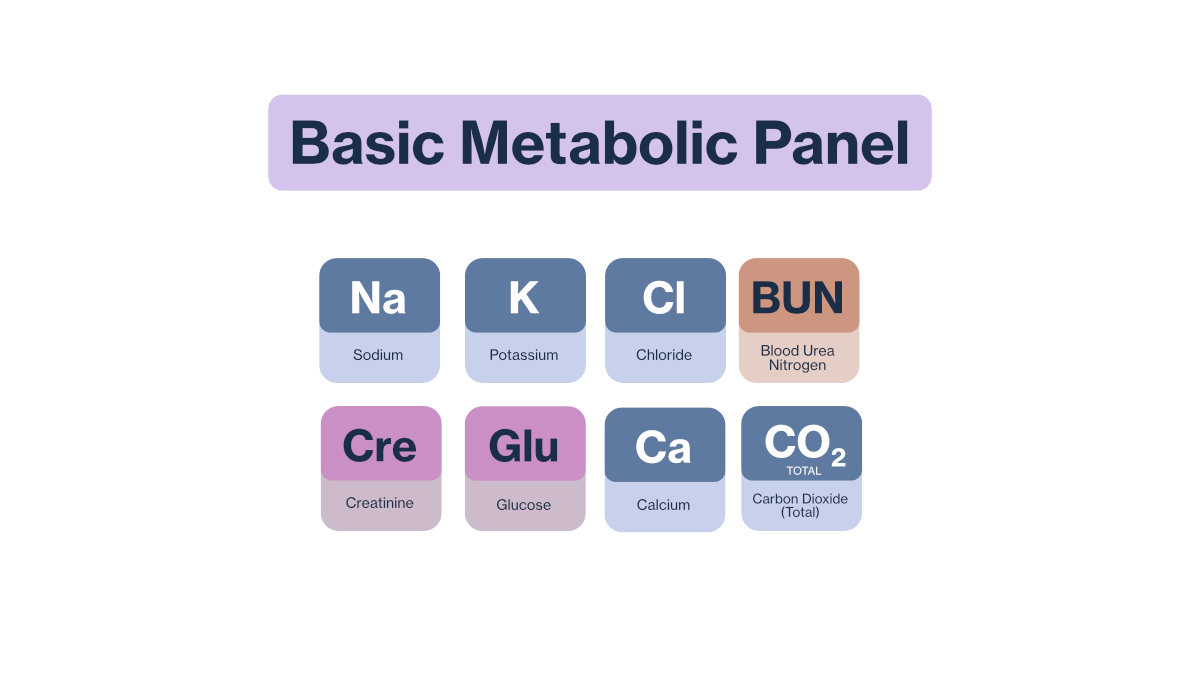AI Bloodwork Interpretation Coming December 2025
The Basic Metabolic Panel (BMP) is one of the most common and important blood tests in medicine. It includes 8 essential markers that evaluate how your body uses energy, balances fluids, and supports vital organs like the kidneys and heart.
This panel helps detect problems with blood sugar regulation, electrolyte stability, and kidney function—making it key in monitoring conditions like diabetes, dehydration, and metabolic imbalances. Whether you’re managing a chronic condition, preparing for surgery, or just checking in on your health, the BMP gives you a snapshot of your body’s inner chemistry.
Curious about a deeper dive?
The Comprehensive Metabolic Panel or CMP builds on the BMP with additional liver function and protein balance – offering a more complete picture.

The Basic Metabolic Panel includes key blood tests that give insight into your kidney function, blood sugar, electrolyte balance, and more. Explore each lab marker individually — what it means, why it matters, and how it fits into the bigger picture of your health.
👉 Click “Read More” to dive into easy-to-understand explanations of each test — what it measures, why it matters, and how it connects to your everyday health.
These results show a well-balanced and healthy metabolic state. Blood sugar (glucose) is in a great range, indicating good energy and insulin regulation. Kidney function markers like creatinine, BUN, and eGFR are all normal, which reflects healthy hydration and efficient filtration. Electrolytes such as sodium, potassium, and calcium are within the ideal range, supporting proper nerve, muscle, and heart function.
Glucose – Good fasting blood sugar level; suggests stable energy and insulin balance.
BUN (Blood Urea Nitrogen) – Indicates normal kidney function and protein metabolism.
Creatinine – Reflects healthy kidney filtration.
eGFR (Estimated Glomerular Filtration Rate) – Excellent kidney function; no signs of decline.
BUN/Creatinine Ratio – Balanced; no evidence of dehydration or kidney stress.
Sodium – Healthy fluid balance and proper nerve function.
Potassium – Supports muscle contraction and heart rhythm.
Chloride – Normal acid-base and fluid balance.
Carbon Dioxide (CO₂/Bicarbonate) – Normal pH balance and buffering in the blood.
Calcium – Supports strong bones, nerve signaling, and muscle function.
The information on this page is provided for educational purposes only and is not medical advice. Lab test results can vary from person to person and must be interpreted in the context of your full health picture — including your symptoms, medical history, and any medications you may be taking.
If you see a result outside the normal range, don’t panic — it doesn’t always mean something is wrong. Only a licensed healthcare provider can accurately interpret your labs and recommend appropriate next steps.
That said, we’ve included general health topics, lifestyle tips, and nutritional guidance that you may find helpful as a starting point for informed conversations with your doctor or registered dietitian.
Understanding your Basic Metabolic Panel (BMP) isn’t just about reading numbers — it’s about connecting each test to your overall health. This section helps you interpret your results by showing which parts of your body are being assessed and what action you can take next.
The BMP Helps Detect:
Every lab test tells a part of your body’s story. In this section, we break down the body systems or health topics related to each test in the panel — like kidney function, metabolism, or liver health. This helps you understand why your doctor might order these tests and how they relate to specific organs or functions.
Whether you’re monitoring a chronic condition or just trying to stay informed, this connection helps turn lab numbers into meaningful health insights. Below you can see the body system, and the lab test associated with it.
BUN, Creatinine, eGFR, BUN/Creatinine Ratio
Sodium, Potassium, Chloride, CO₂ (Total)
Glucose
Calcium
All BMP tests together
Your Basic Metabolic Panel gives insight into how your body is balancing hydration, blood sugar, kidney function, and electrolyte levels. Below are key tests from the BMP with tips you can use to better support your body through small, intentional changes.
This content is for educational purposes only and is not medical advice. Always consult your healthcare provider before making changes to your diet, lifestyle, or treatment plan.
Basic Metabolic Panel (BMP)
These trusted external resources offer additional in-depth information about the Basic Metabolic Panel (BMP).
MedlinePlus: National Library of Medicine
Title: Basic Metabolic Panel (BMP)
Description: A comprehensive overview of the BMP, including what it is, why it’s ordered, what the results mean, and what to expect during the test.
MedlinePlus is a service of the U.S. National Library of Medicine, providing authoritative health information.
Link: https://medlineplus.gov/lab-tests/basic-metabolic-panel-bmp/
Healthline:
Title: Basic Metabolic Panel: Test Details, Results, etc.
Description:
An easy-to-understand guide to the BMP, covering its components, what conditions it helps diagnose, and how to interpret your results. Healthline is a well-known consumer health information website.
Link:
https://www.healthline.com/health/basic-metabolic-panel
CDC:
Title: Healthy Eating Tips
Description:
This page from the Centers for Disease Control and Prevention offers practical, research-based nutrition strategies that support blood sugar, hydration, and electrolyte balance — key factors reflected in your Basic Metabolic Panel.
Link: https://www.cdc.gov/nutrition/features/healthy-eating-tips.html
Important: The information provided on this website is for educational and informational purposes only. It is not intended as medical advice, diagnosis, or treatment and should not be used as a substitute for professional medical care.
Always consult a qualified healthcare provider or licensed physician regarding your individual health concerns, medical conditions, or any questions you may have about lab results, symptoms, or treatments. Never delay or disregard professional advice because of something you read here.
By continuing, you acknowledge that you understand and agree to this disclaimer.